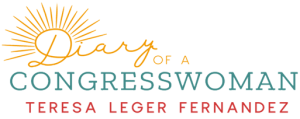Mary-Charlotte Domandi:
I wanted to talk to you today about campaign finance reform, which I think was for some reason it was, I think it was talked about a little less in this last election than in past ones, but it’s a hugely important issue because of the inordinate influence of big money and dark money and soft money, all these concepts that we’ve heard a lot about since the Citizens United decision, which made it harder to regulate and even track campaign contributions. What do you think are the most important changes that need to be made in terms of how political campaigns are financed?
Teresa Leger Fernandez:
Well, what we really need to do is lower the cost of campaigns. And one of the ways you do that is if you can lower the amount of money that is pouring into campaigns. Citizens United made it very difficult to do that because it unleashed unknown amounts of money into Super PACs and into various forms that you can’t even trace. And so what we have now is the need to say, what can we do within the contours of Citizens United? Because Citizens United is a Supreme Court case ruling on a constitutional matter. And given the makeup of the Supreme Court right now there’s not a lot of us to be able to do, to say outright overturn Citizens United. But we can do lots of things. So we need to not see that we are impotent, that we can and we should do a lot of things.
One is pass HR1. Because what HR1 does is say, okay, that’s fine, we can let corporations and we can let all kinds of people donate to campaigns and donate to Super PACs and donate to all kinds of places. But we need to know who’s donating, so that if we see that right now, Coca-Cola is saying–after the fact–voter suppression is not good so we need to make a completely useless public statement that we don’t think that what Georgia did is good. But if we see Coca-Cola is actually spending a whole bunch of money–and I’m just making this up, I don’t know what Coca-Cola is doing–but if they are spending a lot of money to elect people, we can then say, Oh, we know Coca-Cola is doing it, I’m going to drink Pepsi. That people can then make informed decisions about which corporations they might want to go to or not go to, depending on how much money they’re funneling into maybe a Q Anon candidate. If they like Q Anon, they’re going to say, Yay, they support my candidate. And if they think that Q Anon is a very scary thing for the United States of our democracy, they’re gonna say, you know, what, if that’s what you’re doing with the profits that I provide you, when I shop at your place, I’m not going to go there.
So that’s an example of where we can require disclosure of the money that’s going in. So that makes dark money, not dark. And a lot of places–Emily’s List. Emily’s List has a PAC, but they voluntarily to disclose who provides money to them, so there is no dark money. And you can say, well, who is supporting Emily’s list? Oh, these are okay. It’s all out in the open. And so what we’re doing is in HR1 and by requiring disclosure is saying, you know, we shouldn’t rely on the goodness of the entity to say, we’re going to require disclosure, that should be across the board.
So that’s one thing we’re doing. The other thing that HR1 does is actually set up a system for small donations. And there are lots of different ways in which that can be done. That’s one way it’s being done in HR1, where there is some matching contributions you can get, which would then encourage maybe a lot of people who don’t have a lot of money to run. And there are ways in which you can do it like at the state and local level. Right now our PRC candidates, our judicial candidates, and a lot of our city candidates can choose to not raise money, but instead to get a whole bunch of $5 contributions and a bunch of signatures, and they will rely on public financing. So there’s lots of different ways in which we can do it.
And once you start taking out, like there’s a whole bunch of money going in, then everybody needs to raise a bunch of money to be able to meet that, it’s sort of like the arms race. You need to pull it back and say, no, we’re going to start doing it in a way that encourages less money to go in. And then therefore, maybe the campaigns aren’t that expensive. And let’s face it at a certain point in time people are tired of seeing ads, right? They’re turning out. So they’re not listening as much. Those are the kinds of things that HR1 does. But there’s lots of other different ways that we can get at the same thing. I think the whole use, that Obama started and, and that has continued have a lot of grassroots campaign financing where a lot of people are giving you smaller donations is very, very good because that way you, instead of relying on big, big money, you can rely on a lot of smaller donations.
And people do a combination of all those things. I think there are things that are not in HR1 that we can look at doing that I’m not ready to talk about, but I’m trying to have conversations about are the ways of thinking about, you know, we used to have a doctrine where you haw to allow time for the candidates to present information, the air waves, and even the internet, was funded with governmental money. Should we say these are airwaves, so let’s make sure that candidates have the ability, so from a range of things and getting a minimum amount of time to be on the airwaves, to describe who they are so that you can encourage candidates who don’t have access to deep pockets who can’t self-fund to be able to be heard. I mean, I think there’s a lot of different possibilities and we need to remember there are possibilities.
And then there’s some very creative people who are working at doing a constitutional fix, at passing an amendment. And there are various amendments that I would be supportive of. There are several versions out there. I’d be supportive of any of the versions. Some people, when I was running, said, no, you need to be supportive of this version. I said, whichever one we can get passed is the one I’m going to be for. But I’m very supportive of reducing the amount of money in a campaign because I know what it’s like to have to raise money. You know, I’m not really going to talk about my own campaign, but every single candidate has to raise money, to be able to compete and to continue to do the work that they’re doing.
MCD:
The vast majority of Americans, left right and center, are in favor of campaign finance reform and a more level playing field, and the possibility, the idea, that an ordinary person could run for office and win. What’s standing in the way? I mean, this is not–it shouldn’t be–based on the public perception of campaign finance, it shouldn’t be a partisan issue.
TLF:
The filibuster is standing in the way of campaign finance reform passing the Senate. The filibuster is standing in the way of gun safety passing the Senate. The filibuster is standing in the way of immigration, comprehensive immigration, or even getting the Dreamers and our farm workers addressed passing the Senate. And right now that’s what it is because you have a lot of Republicans who are not listening to their constituents. They didn’t listen to their constituents around the American Rescue Plan and they didn’t vote for it even though there is strong support for that. Gun safety legislation, incredible support, and they’re not listening to their constituents. So a big issue is to see what happens in the Senate, because right now the House Democrats have been listening to those issues and passing those bills.


